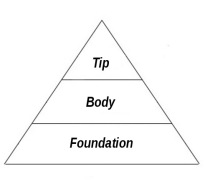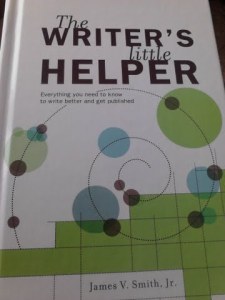So this blogging challenge hasn’t exactly been working out too well. I struggled to get my 2 posts a week for the first couple weeks, and then just stopped altogether for the last several. That’s not quite hitting the ground running, is it?
I have no excuses as to why. Well, I do have excuses, just not good ones. Any reason I named for not writing would crumble faster than a proverbial cookie. I’ve been busy, yes, but I’ve also had enough snatches of free time that I could have gotten something done. All things considered, right now SHOULD be the time where I get my writing life in gear.
I have a 1 year old who, unlike any child I have ever known, already sticks to a schedule as far as when she eats, sleeps, and needs extra attention. I can plan around spending time with her and be at least 95% sure those plans will remain in tact.
School has a lot of work that has to be done first, but none of it is TOO labor intensive. It’s challenging and engaging without being really overwhelming, even when I wait to the last possible moment to do the work.
My wife is starting a new job and early returns would appear that she is finally going to be happy at work, which hasn’t been true in a few years now. Don’t know her real schedule yet, so that will require some balancing in the future, but the midnight to 8am shift she’ll be working will still leave me some free time. Not to mention the fact that if she’s happy at work, she’ll be happier at home, which makes EVERYONE happier.
All these excuses that I held in front of me like a shield have been obliterated. I’m disappointed in myself for not doing more, but I’m trying not to berate myself too badly as that usually makes the problem worse. So what’s a whiny, procrastinotic (procrastinating psychotic), wanna be writer to do?
The answer is: write. But that’s not happening. Not how I want it to anyway. I mean, even this blog post is taking me away from my true goals. Sure, it’s writing, but not what I want to work on, so I’m torn between being happy for any progress and being frustrated it’s not the progress I’d hope for.
And believe me, I can hear the millions of people reading this (<—- that’s me being uncharacteristically optimistic about my work, just trying it out), screaming “Just do it!” at me. Well… that slogan never made me buy sneakers, so I don’t think it’s going to work here either. Logically, I know the value of that kind of attitude. I’ve read any number of blogs hailing that very strategy. To write, all you have to do is write. Right? Stop avoiding it and just make yourself sit there and do it, no matter how painful it is.
Sounds good, but I have strong problems when it comes to putting it into practice. It’s hard to resist just throwing in the towel and calling it a dream that will never be realized. Of course, the quickest way to make that true would be to give up, so I struggle on, trying to piece together something that works for me.
I don’t know what that will be. But if I’m being 100% honest, and not the pessimistic ass-clown I can be when it comes to my own work, I think I’m close to figuring it out. It just feels like I’m on the edge of a breakthrough and all it’s going to take is a nudge to go over that edge and then never look back.
It all started with this blog: http://bigglasscases.blogspot.com/2011/01/you-are-not-original-and-thats-ok.html
It’s a piece about the not-so-original ideas throughout all genres of writing, and how you can still make them work even if they’ve been done before.
This post was significant to me for two reasons:
1. I have a tendency to obsess over original ideas. To the point where if it’s not original then I just don’t want to do it. This makes life exceedingly difficult when you consider that the thought of an ‘original idea’ in the field of storytelling is just short of mythical. Not saying it can’t happen, but odds are MUCH greater that you’re just going to be able to figure out an original tweak to an old idea. Which to the overachieving part of my mind, just isn’t good enough.
I need to get that part of my mind to shut up and realize that just because it has been done before doesn’t mean I can’t do it again with my own take on it. The idea may not be original, but my presentation of it will be just because it came from me. That’s important, and that’s how writers end up being successful using the same recycled archetypes.
2. It applied to my current work in progress directly in that one of the cliched ideas presented was one I was trying to use and didn’t even realize it. Something was off, and I couldn’t get passed it. As soon as I read this blog post, I heard that ‘click’ in my head, and ideas began falling into place, as creative inspiration flowed. I saw what was wrong, and I knew how to fix it.
This gave me a feeling that I hadn’t felt about writing in some time… excitement.
Unfortunately, I wasn’t able to do anything about it immediately (and that’s no excuse, just a simple fact). So it was like someone had thrown open the escape hatch, and I was too surprised to climb through. By the time I could move again, it was closed.
It was a missed opportunity, which carries me into my current feelings. The side of me that is desperate to try and succeed, and the side of me that condemns every little thing I do and wants nothing more than to plod along in the status quo are perfectly in balance. Getting back to this blogging challenge is a nod to the positive side (progress), and the fact that I’m doing this rather than working on my story is a nod to the negative (same old shit, different day). Something is going to give, that much I know. The side that will end up yielding, that’s a mystery to me right now. I know I’m capable of achieving what I want.
I just have to get out of my own way.








Passion, Not Venom
I have my favorites. Books, sports teams, music, movies, video games, food, and so on. Things I feel passionate enough about to recommend to others, to defend against attacks, and to explain the reasons why I like them so much when compared to other things.
One thing I’ve never felt compelled to do is to state my opinion with such vehemence that I leave no room for the possibility of people feeling differently than I do about (insert title/team/food etc here). I’ve never felt compelled to attack people for their likes and dislikes. I’ve never felt the need to ridicule them for liking something that I think it’s odd for a person like them (whoever they may be) to like. There are things I love and am passionate about, but not so passionate that I feel the need to try to convert people to thinking the same way as me about them. It’s okay for people to like other things. It’s more than okay, it’s a simple fact of life. Billions of people sharing the same thought about the same thing? Just not going to happen.
That ideal is so simple and such a given to me that I simply do not understand the venom some people choose to spew over the things they dislike. Whether it be directed at the creators of such things or the people who enjoy them.
Truth be told, I’m a pretty easy mark when it comes to entertainment. I can find some kind of value in pretty much anything. Some people might call that low standards, but personally I think it’s just a highly developed ability to seek and find the silver linings, and appreciate a work for its positives rather than condemning it for the negatives. I can’t think about a topic like this without thinking of Stephanie Meyer’s Twilight series. A polarizing work if there ever was one.
I like the books. Are they literary masterpieces? No. But I never expected them to be. There are two aspects of the series though, that I feel deserve recognition and admiration. One, Stephanie Meyer really keyed in on her target audience with the story. It’s possible for everyone to find enjoyment in everything, but this book was definitely aimed at the teen girl audience, and I felt that the writing and the story reflected that. She’s clearly no Shakespeare, but how well does Shakespeare really go over in most high school English classes? The voice, the style, the writing all hit the right notes for the intended audience. It may not hit the standards you want/expect for yourself, but there are ways to express that without out right attacks or condemning her for her success.
The second thing I found exceptional about the series is Meyer’s courage to take such an iconic figure like a vampire and change it into something so different. Believe me, I prefer my vampires more monstrous and less sparkly, but for someone to even conceive of that idea and put it into practice is something that takes a unique mind and strong spine. In a realm where truly original ideas are pretty tough to come by, that one ranks up there as one of the more original in a very long time. Whether I think it was the “right” choice or not, when there really is no right or wrong to begin with, I can still admire the originality and how she made it work for her.
Just like I can laugh at the low-brow comedy of Adam Sandler, find enjoyment in the music of Nickelback, and greatly appreciate the superb technical aspects of Citizen Kane (even while thinking that the movie itself is one of the most boring things I’ve ever seen). Even when I don’t like something, even when the appeal makes absolutely no sense to me whatsoever (The Jersey Shore for example) I’ve never once wondered how something gets popular. I know exactly how things like that get popular. I already said it earlier. There are BILLIONS of people on this planet. That’s billions with a b. Just a bit under 7 billion people actually. Do you know what 1 percent of 7 billion is? 70 million. That means if just one percent of the world shares a similar mindset and likes something, 70 MILLION people like it. Getting one percent of anything isn’t all that difficult, so ultimately nothing surprises me when it comes to what people find enjoyment in.
I’m not arrogant or foolish enough to think that everyone is going to think like me. Nor do I care enough to expend energy trying to convince people to do so. I have more than enough going on in my life to consume my energy, that’s not an area I choose to spend my time worrying about. Simply stating my opinion and allowing them the space and courtesy to make up their own mind is enough. After all, if one person doesn’t agree, there are still 6,999,999,999 more people to go.